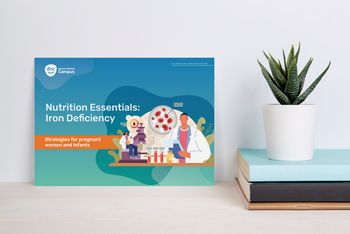Nutrition essentials: Iron deficiency
booklet
Collection
Course
Nutrition essentials: Iron deficiency

This website contains scientific and medical information intended only for healthcare professionals.

Iron deficiency is a prevalent global health issue, affecting one in three individuals worldwide. Vulnerable groups include infants, children, adolescents, and pregnant women, each with distinct iron requirements influenced by age, gender, pregnancy, or lactation. This booklet examines the multifactorial causes of iron deficiency—from increased physiological demands to decreased absorption due to chronic disease or parasitic infections—and its wide-ranging health impacts, including anemia, impaired cognitive development, and reduced physical performance. It also addresses the need for accurate diagnosis through laboratory testing and outlines practical approaches for prevention and management.
You will gain evidence-based insights into:
Recommended daily iron intake by age, gender, and life stage
Causes ranging from chronic illness to environmental and dietary factors
Diagnosis using laboratory assessments
Treatment approaches, including supplementation, dietary diversification, and fortification
Managing gastrointestinal side effects to improve compliance
Enhancing iron absorption with prebiotics and probiotics
Integrating nutritional interventions with health education and early-life prevention strategies
Download the full booklet to access detailed strategies, clinical recommendations, and supporting evidence for preventing and managing iron deficiency in diverse patient populations.
Please sign in or create a free account to download files.
We’ve handpicked this content to bring you credible insights from across the web. Click the button to open it in a new tab and enjoy!
missOrigin
missOrigin
missOrigin
missOrigin